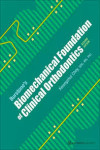ALIGNER ORTHODONTICS AND OROFACIAL ORTHOPEDICS
Werner Schupp / Julia Haubrich
Datos técnicos
- ISBN 9781786981066
- Año Edición 2023
- Páginas 672
- Encuadernación Tapa Dura
- Idioma Inglés
Sinopsis
This book presents useful tips and strategies on how to integrate aligner orthodontics successfully into clinical practice, whether outsourced or with in-office aligner treatment. This second edition sees the authors review the diagnostic protocols and the biomechanics of aligners before presenting aligner orthodontics protocols. Supported by accompanying case documentation, the discussion of each malocclusion includes information on the associated symptoms, the rationale behind the selected treatment approaches, and the various outcomes achieved. The separation into sections on each malocclusion helps patients and clinicians in deciding whether this system can provide optimal treatment outcomes for a particular clinical situation. This is a practical manual for any clinician interested in the treatment modality of aligner orthodontics.
Índice
Chapter 1. Physiology and functional neuroanatomy of the temporomandibular system and musculoskeletal system
Chapter 2. Biomechanical aspects of tooth movement with aligners
Chapter 3. Diagnostics
Chapter 4. Treatment planning and treatment with aligners
Chapter 5. Treatment of different malocclusions with different aligner systems
Chapter 6. Advantages of aligner orthodontics
Chapter 7. Avoid global warming and plastic waste
With contributions from:
Yuxing Bai • Wolfgang Boisserée • Fayez Elkholy • Bernd Lapatki • Julia Funke
Otros libros que te pueden interesar
- ¿Quiénes somos?
- Gastos de envío
- Política de privacidad
- Políticas de devolución y anulación
- Condiciones Generales de contratación
- Contacto
2025 © Vuestros Libros Siglo XXI | Desarrollo Web Factor Ideas










